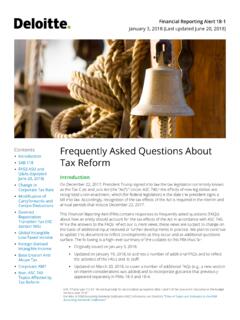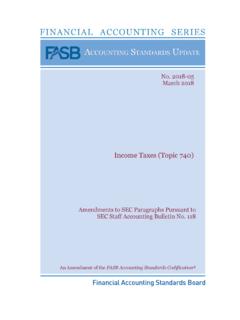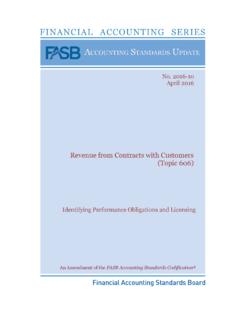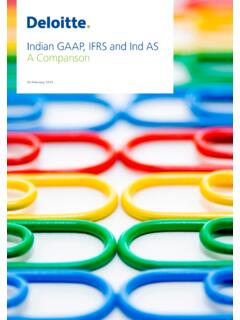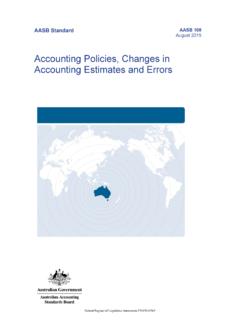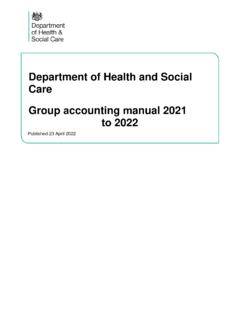Transcription of ICDS, Indian GAAP and Ind AS Comparison - Deloitte
1 ICDS, Indian GAAP and Ind AS Comparison May 2015 ContentsIntroduction to Income Computation and Disclosure StandardsIntroduction to Indian accounting StandardsComparison of ICDS, Indian GAAP and Ind AS23 ICDS, Indian GAAP and Ind AS Comparison 3 Introduction to Income Computation and Disclosure StandardsIncome Computation and Disclosure standards notified for computation of taxable incomeOn 31 March 2015, the Central Board of Direct Taxes ( CBDT ) notified the Income Computation and Disclosure standards ( ICDSs ) which will come into effect from 1 April 2015 and shall accordingly apply for assessment year 2016-17 on notified ICDSsA draft of 14 Tax accounting standards were first issued in August 2012. However, these were revised further and 12 draft ICDSs were issued in January 2015 for public comments.
2 By way of above notification, 10 ICDSs were finalised excluding the standards on Leases and Intangible Assets . Following ICDSs have been issued on 31 March 2015 by the CBDT:ICDSs have been notified by the Government as per powers granted under section 145(2) of the Income-tax Act, 1961 ( Act ). The notified ICDSs shall supersede the existing accounting standards notified by the CBDT on 25 January 1996 ( existing tax AS') relating to disclosure of accounting policies and disclosure of prior period and extraordinary items and changes in accounting apply to all taxpayers following accrual system of accounting for the purpose of computation of income under the heads of Profits and gains of business / profession and Income from other sources.
3 Further, the method of accounting prescribed in ICDSs is mandatory else, as per section 145(3) of the Act, income can be recomputed by tax has been specifically stated in the Preamble to all the ICDSs that they are only for income computation and not for maintenance of books of account. The Preamble also mentions that in case of conflict between the provisions of the Act and ICDS, the Act shall prevail to that provides standards in various areas for computation of taxable income. In case of conflicts between the provisions of the Act and ICDS, Act would prevail. However, in case the Act is silent or ambiguous, the interplay between ICDS and existing jurisprudence needs to be evaluated. Also, while ICDS applies to prospective income computation for tax purposes, it is not clear whether ICDS impacts even existing accounting treatments which were used as a base for computing taxable treatment cannot be taken for granted and must be reevaluated from an ICDS new Indian accounting standards (Ind AS) are being made mandatory for certain class of companies with effect from 1 April 2016.
4 Accordingly, differences between ICDS and the Indian GAAP / Ind AS must be mapped by companies to assess the impact on taxable income including book profits as well as maintenance of relevant issued1 ICDS I relating to accounting policies 2 ICDS II relating to valuation of inventories3 ICDS III relating to construction contracts4 ICDS IV relating to revenue recognition5 ICDS V relating to tangible fixed assets6 ICDS VI relating to the effects of changes in foreign exchange rates7 ICDS VII relating to government grants8 ICDS VIII relating to securities 9 ICDS IX relating to borrowing costs10 ICDS X relating to provisions, contingent liabilities and contingent assets4 Introduction to Indian accounting StandardsRecently, the Indian accounting standards ( Ind AS ) were notified on 16 February 2015 by the Ministry of Corporate Affairs ( MCA ).
5 MCA notified the Companies ( Indian accounting standards ) Rules, 2015 (pending publication in the Gazette of India) which specify the Ind AS applicable to certain class of companies and set out the dates of adoptionCompanies may voluntarily adopt Ind AS for financial statements for accounting periods beginning on or after 1 April 2015, with the comparatives for the periods ending 31 March 2015 or thereafter. Once a company opts to follow the Ind AS, it will be required to follow the same for all the subsequent financial adoptionFor the accounting periods beginning on or after 1 April 2016 For the accounting periods beginning on or after 1 April 2017 The following companies will have to adopt Ind AS for financial statements from the above mentioned date: - Companies whose equity and/or debt securities are listed or are in the process of listing on any stock exchange in India or outside India (listed companies) and having net worth of Rs.
6 500 crores or more. - Unlisted companies having a net worth of Rs. 500 crores or more. - Holding, subsidiary, joint venture or associate companies of the listed and unlisted companies covered above. Comparative for these financial statements will be periods ending 31 March 2016 or thereafter. The following companies will have to adopt Ind AS for financial statements from the above mentioned date: - Listed companies having net worth of less than Rs. 500 crore. - Unlisted companies having net worth of Rs. 250 crore or more but less than Rs. 500 crore. - Holding, subsidiary, joint venture or associate companies of the listed and unlisted companies covered above. Comparative for these financial statements will be periods ending 31 March 2017 or roadmap will not be applicable to: Companies whose securities are listed or in the process of listing on SME exchanges.
7 Companies not covered by the roadmap in the Mandatory adoption categories above. Insurance companies, banking companies and non-banking finance companies should continue to apply existing accounting standards prescribed in the Annexure to the Companies ( accounting standards ) Rules, 2006, unless they opt for voluntary adoption. Insurance companies, banking companies and non-banking finance companies cannot voluntarily adopt the Ind AS. ICDS, Indian GAAP and Ind AS Comparison 5 Comparison of ICDS, Indian GAAP and Ind ASThe table on the following pages set out some of the key differences between ICDS, Indian GAAP (including the provisions of Schedule III to the Companies Act, 2013, where considered necessary) and Ind AS. The Comparison with respect to Indian GAAP and Ind AS is only limited to the ICDSs which have been to Indian GAAP are to the standards notified by the Central Government under the Companies ( accounting standards ) Rules, 2006 (applicable to all companies) vide notification (E) dated 7 December 2006, as amended and to the relevant requirements of the Companies Act, summary does not attempt to capture all of the differences that exist or that may be material to a particular entity nor does it include differences relating to pronouncements by other regulators such as The Reserve Bank of India, etc.
8 Our focus is on differences that are commonly found in practice. Accordingly, we recommend that readers seek appropriate professional advice regarding any specific issues that they encounter. This publication should not be relied on as a substitute for such significance of these differences and others not included in this list will vary with respect to individual entities depending on such factors as the nature of the entity s operations, the industry in which it operates and the tax positions and accounting policy choices it has made. Reference to the underlying accounting standards , the Income-tax Act, 1961, the Income-tax Rules, 1962 (the Rules"), relevant judicial pronouncements, etc. and any relevant national regulations is essential in understanding the specific used in this publication are as follows.
9 ICDSI ncome Computation and Disclosure standards issued by the CBDT on 31 March 2015 Ind ASIndian accounting standards notified by the MCA on 16 February 2015 ASIndian accounting Standard(s) Notified under the Companies ( accounting standards ) Rules, 20066 TopicICDSI ndian GAAP Ind ASAccounting Policies,Changes in AccountingEstimates and Errors primary literatureICDS I relating to accounting policiesAS 1 Disclosure of accounting PoliciesAS 5 Net Profit or Loss for the Period, Prior Period Items and Changes in accounting PoliciesInd AS 1 Presentation of Financial StatementsInd AS 8 accounting Policies, Changes in accounting Estimates and ErrorsAccounting Policies, Changes in accounting Estimates and Errors consideration in selection of accounting policiesTo represent a true and fair view of the state of affairs and income of the business, profession or vocation.
10 The treatment and presentation of transactions and events shall be governed by their substance and not merely by the legal major considerations governing the selection and application of accounting policies are:-a. Prudenceb. Substance over Formc. MaterialityWhen an Ind AS specifically applies to a transaction, other event or condition, the accounting policy or policies applied to that item shall be determined by applying the Ind Policies, Changes in accounting Estimates and Errors mark to market losses and expected lossesThere is a specific provision that marked to market loss or an expected loss shall not be recog-nised unless the recognition of such loss is in accordance with the provisions of any other ICDS. For example, ICDS II provides for valuation of inventories at cost or net realisable value, whichever is lower.






